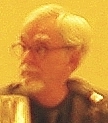John Perry (philosopher) facts for kids
Quick facts for kids
John R. Perry
|
|
|---|---|
 |
|
| Born | January 16, 1943 Lincoln, Nebraska, U.S.
|
| Education |
|
| Era | 20th-century philosophy |
| Region | Western philosophy |
| School | Analytic philosophy |
| Academic advisors |
|
| Doctoral students | John Etchemendy Thomas Hofweber |
|
Main interests
|
|
|
Notable ideas
|
Situation semantics Slingshot argument |
John Richard Perry, born on January 16, 1943, is an American philosopher. He is a retired professor from Stanford University and the University of California, Riverside. He has made important contributions to philosophy, especially in how we use language, what reality is, and how our minds work.
He is famous for his ideas on how situations give meaning to words. He also studied how we understand ourselves and how words like "I" or "here" are special.
Contents
Life and Career of John Perry
John Perry was born in Lincoln, Nebraska, on January 16, 1943. He studied philosophy at Doane College and later earned his Ph.D. from Cornell University in 1968. His main teachers were Keith Donnellan, Max Black, and Sydney Shoemaker.
He taught philosophy at the University of California, Los Angeles from 1968 to 1974. Then, he moved to Stanford University in 1974, where he taught until 2008. After that, he taught at the University of California, Riverside from 2008 to 2014. He is now a retired professor at both Stanford and UC Riverside.
Awards and Recognition
In 1999, John Perry received the Jean Nicod Prize, a very important award in philosophy. He is also a member of the American Academy of Arts and Sciences and the Norwegian Academy of Science and Letters. These are groups that recognize top thinkers and scientists.
He also co-hosted Philosophy Talk, a radio show about philosophy that he helped start in 2004. He was part of a research group at Stanford called the Center for the Study of Language and Information (CSLI).
John Perry's Philosophical Ideas
John Perry has explored many areas of philosophy. These include logic, the philosophy of language, metaphysics (the study of reality), and the philosophy of mind (the study of how our minds work).
Understanding Personal Identity
In 1978, Perry wrote a book called A Dialogue on Personal Identity and Immortality. This book discusses big questions about what makes you you over time. It's written as a conversation between a professor named Gretchen Weirob and her two friends. They talk about different ideas on personal identity, including those from famous philosophers like John Locke.
Logic and Meaning
Perry, along with Jon Barwise, also discussed something called the slingshot argument in logic. This argument looks at how sentences relate to what they mean in the real world. They wrote about it in their 1981 article, "Semantic Innocence and Uncompromising Situations."
Mind and Reality
In his 2001 book, Knowledge, Possibility and Consciousness, Perry talked about physicalism. This is the idea that everything, including our minds, is ultimately physical. He argued that physicalism is a good way to understand the world. He defended this idea against other views that suggest the mind might be separate from the body.
Fun with Procrastination
John Perry also wrote a funny essay in 1996 called "Structured Procrastination." For this humorous work, he won an Ig Nobel Prize in 2011. The essay suggests that to get a lot done, you should always work on something important. You can use this important task as a way to avoid doing something even more important!
The Problem of "I"
In 1979, Perry published an important paper called "The Problem of the Essential Indexical." In this paper, he looked at words like "I," "here," and "now." He called these "essential indexicals" because they are crucial for understanding our beliefs and actions.
He gave a famous example:
"I once followed a trail of sugar on a supermarket floor, pushing my cart down the aisle on one side of a tall counter and back the aisle on the other, seeking the shopper with the torn sack to tell him he was making a mess. With each trip around the counter, the trail became thicker. But I seemed unable to catch up. Finally it dawned on me. I was the shopper I was trying to catch."
In this story, the word "I" was essential for Perry to realize he was the one making the mess. This realization made him change his behavior. If he had just thought, "Perry is making a mess," it wouldn't have had the same immediate effect. The word "I" connects the thought directly to the person thinking it, leading to action.
See also
- List of Jean Nicod Prize laureates
 | James Van Der Zee |
 | Alma Thomas |
 | Ellis Wilson |
 | Margaret Taylor-Burroughs |

